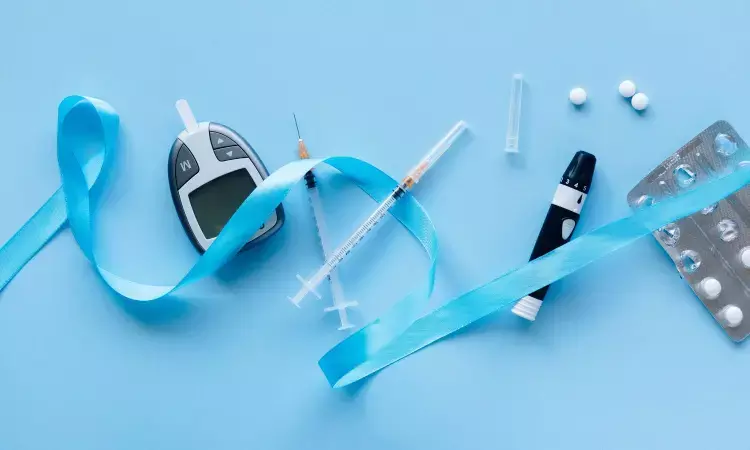- Home
- Medical news & Guidelines
- Anesthesiology
- Cardiology and CTVS
- Critical Care
- Dentistry
- Dermatology
- Diabetes and Endocrinology
- ENT
- Gastroenterology
- Medicine
- Nephrology
- Neurology
- Obstretics-Gynaecology
- Oncology
- Ophthalmology
- Orthopaedics
- Pediatrics-Neonatology
- Psychiatry
- Pulmonology
- Radiology
- Surgery
- Urology
- Laboratory Medicine
- Diet
- Nursing
- Paramedical
- Physiotherapy
- Health news
- Fact Check
- Bone Health Fact Check
- Brain Health Fact Check
- Cancer Related Fact Check
- Child Care Fact Check
- Dental and oral health fact check
- Diabetes and metabolic health fact check
- Diet and Nutrition Fact Check
- Eye and ENT Care Fact Check
- Fitness fact check
- Gut health fact check
- Heart health fact check
- Kidney health fact check
- Medical education fact check
- Men's health fact check
- Respiratory fact check
- Skin and hair care fact check
- Vaccine and Immunization fact check
- Women's health fact check
- AYUSH
- State News
- Andaman and Nicobar Islands
- Andhra Pradesh
- Arunachal Pradesh
- Assam
- Bihar
- Chandigarh
- Chattisgarh
- Dadra and Nagar Haveli
- Daman and Diu
- Delhi
- Goa
- Gujarat
- Haryana
- Himachal Pradesh
- Jammu & Kashmir
- Jharkhand
- Karnataka
- Kerala
- Ladakh
- Lakshadweep
- Madhya Pradesh
- Maharashtra
- Manipur
- Meghalaya
- Mizoram
- Nagaland
- Odisha
- Puducherry
- Punjab
- Rajasthan
- Sikkim
- Tamil Nadu
- Telangana
- Tripura
- Uttar Pradesh
- Uttrakhand
- West Bengal
- Medical Education
- Industry
Daily Oral GLP-1 Pill Shows Promise for Diabetes and Obesity Treatment: Study

A new oral GLP-1 medication can help adults with obesity and Type 2 diabetes lose more weight and improve their blood sugar levels compared to a placebo, according to findings from the ATTAIN-2 trial led by a UTHealth Houston researcher.
Obesity is a chronic health condition that can cause serious complications such as Type 2 diabetes, heart disease, high blood pressure, sleep apnea, certain cancers, and more. Current GLP-1 treatments for obesity consist of daily or weekly injectable medications that come with drawbacks, including the need for cold chain distribution and storage, risk of injection site reactions, and needle-related discomfort.
The findings, published today in The Lancet, found an alternative treatment for adults with Type 2 diabetes and obesity: a daily oral GLP-1 pill called orforglipron.
“The opportunity for an oral GLP-1 medication with highly effective weight loss that is simpler to take may provide increased access and opportunities for better health for our patients with obesity and diabetes,” said Deborah Horn, DO, MPH, professor and director of obesity medicine at McGovern Medical School at UTHealth Houston and principal author of the study.
Orforglipron is a small‑molecule, nonpeptide GLP‑1 receptor agonist in pill form that should be taken once a day. The pill stimulates insulin release and reduces glucagon secretion, lowering blood sugar and controlling appetite and food intake. It requires no refrigeration and has no restrictions on the timing of food or water intake.
In previous studies, orforglipron reduced body weight by 12.4% and improved cardiometabolic risk factors after 72 weeks in adults with obesity without diabetes. Researchers then began to investigate these effects in adults with obesity and co-existing Type 2 diabetes.
This trial, ATTAIN-2, was a double-blind 72-week trial in 136 sites across 10 countries. Researchers started 1,613 adults in the trial on 1 mg of orforglipron and increased the dose every four weeks until patients received 6 mg, 12 mg, and 36 mg, while other patients received a placebo. Throughout the study, participants were advised to eat a healthy diet and exercise with the goal of weight loss. This healthy diet is a new and different approach compared to most obesity trials, which usually require a 500-calorie reduced diet. Instead, researchers encouraged participants to manage portion control, avoid skipping meals, and increase protein- and fiber-rich foods; limit saturated fats, added sugar, and salt; and engage in at least 150 minutes of physical activity a week.
After 72 weeks, patients who received up to 6 mg of orforglipron averaged a weight loss of 5.5%, those who received 12 mg averaged 7.8%, and those who received 36 mg averaged 10.5%, while the placebo group averaged just 2.2%. The pill significantly improved blood sugar and caused only mild to moderate gastrointestinal side effects, similar to common doses of injected GLP-1.
“We know it is harder for individuals with diabetes to lose weight. It is exciting to have an oral medication that provides double-digit weight loss, which on average was 23 lbs. Once FDA approved, orforglipron is scheduled to be available in 2026 at a significantly decreased cost compared to current injectables. This could position it to be the ‘metformin’ of obesity and become widely covered by insurance plans, opening the door to treatment for all,” Horn said.
Orforglipron, the easier‑to‑use alternative to injectable weight‑loss and diabetes medications, is a promising new tool with improved convenience for providers and patients.
Reference:
Horn, Deborah B et al., Orforglipron, an oral small-molecule GLP-1 receptor agonist, for the treatment of obesity in people with type 2 diabetes (ATTAIN-2): a phase 3, double-blind, randomised, multicentre, placebo-controlled trial, The Lancet, Volume 0, Issue 0.
Dr Kamal Kant Kohli-MBBS, DTCD- a chest specialist with more than 30 years of practice and a flair for writing clinical articles, Dr Kamal Kant Kohli joined Medical Dialogues as a Chief Editor of Medical News. Besides writing articles, as an editor, he proofreads and verifies all the medical content published on Medical Dialogues including those coming from journals, studies,medical conferences,guidelines etc. Email: drkohli@medicaldialogues.in. Contact no. 011-43720751


